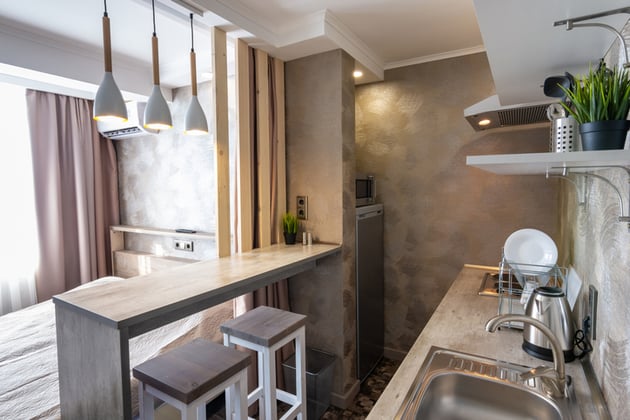
Boutique hotels continue to gain traction across travel markets. Guests expect rooms that feel intentional and thoughtfully designed.
In compact spaces, every design choice carries weight. Small boutique hotel room design must account for:
- Comfort
- Reliability
- Ease of use
Behind the scenes, motion control influences how these expectations translate into daily performance. Hinges, lift systems, and counterbalance mechanisms affect how furniture moves, how storage functions, and how the room holds up over time.
Before finalizing specifications, clarify the mechanical details that shape performance, cost, and durability. The following factors will help guide that conversation.
8 Small Boutique Hotel Room Design Details That Make It Work
Contracting your engineering and manufacturing needs should be a two-way relationship! Conversations to have with your motion control equipment manufacturer include:
- Footprint
- Load management
- Durability
- Storage
- Ergonomics
- Aesthetics & luxury vs. practical
- Environmental safety
- Missed opportunities
1. Product Footprint
The manufacturer needs to know what kind of space it's working with.
What are the dimensions of your product? How much space do you hope to add by adding a motion control solution?
Heavy objects may require a large, bulky hinge, in which case the manufacturer may recommend a concealed hinge so it isn’t intrusive.
No equipment or casegood is an island, so explain the big-picture relationship of your product to the rest of the room. Even if the hinge manufacturer is only working on one element of your room, sharing context benefits both sides. At a bare minimum, explain:
- Layout/size of the room
- Where in the room the product will go
- What other items will be close by
2. Load Management
How heavy-duty of a hinge design does your product need? This will determine the type of hinge design guidelines (spring assist, counterbalance, etc.) your vendor will follow.
Clearly communicate your product cover’s or door’s:
- Surface dimensions
- Weight
- Center of gravity
- Desired hinge action & features
You may also prefer a certain "feel" when a user opens or closes a hinged door or cover. A manufacturer with a design engineering team can customize the opening/closing speed and "stay" of your door or cover at various points along its range of motion. For example, the vendor can customize a countertop hinge to make a 100 lb. flip-up door feel like 10 lbs., 5 lbs, or another number.
3. Durability
Is the product something visitors will use several times daily? Once a day? Perhaps never, if it's more luxury than necessity? How often is the room used in general?
A motion control manufacturer's engineering team can customize a hinge's life cycle to your specs. (Naturally, more durability = higher price.)
Convey how much “traffic” your product will get so you’re not replacing or repairing the hinge prematurely.
4. Storage
The best small boutique hotel room design ideas incorporate multifunctional design.
If you’re struggling for inspiration, ask the contractor how your product can accommodate extra storage or free up space. There may be opportunities you hadn't thought of, but the manufacturer may have already helped a past customer with.
Creative storage solutions don’t just make a small room more functional; they also bring that “wow!” factor visitors love.
Consider these options:
- Moveable short walls – featuring a shallow bookcase on one side and a TV/entertainment stand on the other. Not only does it provide a mobile degree of separation for a room, but it also upgrades aesthetic appeal & functionality!
- Murphy beds
- Fold down surfaces for suitcase storage, tables, etc.
5. Ergonomics & Safety
Optimizing for ergonomics in the hospitality industry is an exercise in mindfulness: Not everyone is there for leisure and luxury!
Need comfy accommodations for business travelers? Make sure your manufacturer’s or distributor’s products account for hotel ergonomics. Users of hotel computer rooms and business centers will appreciate ergonomic and adjustable:
- TV mounts
- Computer monitor arms
- Keyboards
- Mouse trays
- Chairs
Ergonomic design is wonderful for hotel staff’s convenience too – and for decreasing injuries and insurance claims! Heavy lifting is a common culprit for wear and tear, so ask about how motion control can ease repetitive tasks for housekeeping and other departments.
Again, designers on both sides should review how to counterbalance and mitigate weight, especially in applications like:
- Pass-through bar tops and kitchen countertops
- Murphy storage beds with lift-up hinge mechanisms
- Fold-away tables
6. Aesthetics & Luxury vs. Practical
If your design will be highly visible, you don't want to tarnish that with an ugly addition. Tell the manufacturer how you envision its solution fitting in with the rest of your small hotel/motel design.
For harsh end-use environments, avoid finishes and colors that are tough to keep looking clean (yuck) or easily corrode over time (double yuck). A manufacturer can create unique textures and colors via powder coating to blend your hinge seamlessly into your design.
(Alternatively, consider a concealed hinge design if you require a bulky device that'd look unsightly on your product.)
Luxury is about more than just aesthetics. If you want to wow people staying at your hotel, smooth, high-end motion control features may be a better choice than basic solutions. Be proactive about helping the supplier understand your wishes, and it can build a custom motion that wows 'em every time.
Don't be shy about communicating the opposite, too. If practicality and budget are more important than showing off, let your supplier know!
7. Environmental Safety
Guest rooms are rarely the primary source of environmental hazards in a hotel. Still, certain features may require a discussion with your vendor about safety.
For example, if you have a tiny kitchen in the room, specify heat-resistant hinges in ovens and discuss the direction/function of swinging the door open. Also, in any application that's food-adjacent (like a prep table in the communal kitchen/lobby), ask for hinge technology that doesn’t leak toxic chemicals.
8. Missed Opportunities
Do you realize just how many places you can add motion control? If you and your manufacturing partner have a good thing going, ask about other ways to upgrade your products:
- Hotel sleeper chairs: Patrons with kids or unexpected company can unfold this instant slumber party as needed. A well-engineered sleeper chair can not only save space but also – gasp – be comfy.
- Pop-up monitors and TVs: Users can pop these genius devices out of the desk and push them away when they no longer need them. A clever manufacturer can integrate them into any desk or table, as long as there’s space. Ask about a “touch latch” feature – this lets users simply touch the device to activate the rising motion until the lock catches.
- Outdoor hospitality spaces: Clever mechanical hinge design is just as welcome in outdoor equipment! Examples include pass-through breakfast bars and fold-out picnic tables.
Tiny hotel rooms are just like tiny houses: Every piece of furniture or equipment is a chance to add value.
Bringing Small Boutique Hotel Room Design to Life
These tips for working with a motion control manufacturer can help you set and meet a realistic project budget and timeline. Some suppliers offer testing and prototyping to further validate your model; keep this in mind when choosing a partner.
Most of all, remember that every element of your room is an opportunity! To learn more about improving guest experience with motion control, see our Hospitality page:
Talk Through Your Boutique Hotel Room Design
If you’re refining specifications or weighing motion control options, connect with an engineer to review your design and next steps.
This article was originally published in September 2023 and was recently updated to reflect current industry trends.
.png?width=12000&height=2033&name=WeberKnappLogo_white%20(1).png)


